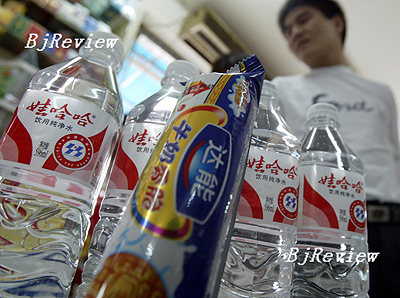|

In early April, Zong Qinghou, Board Chairman and General Manager of the Hangzhou-based Wahaha Group Co. Ltd., China's largest beverage group, revealed to the media that its French partner Groupe Danone, one of the world leaders in the food industry, planned to buy 51 percent of the shares of Wahaha Group's non-joint venture companies using the brandname "Wahaha."
But Danone's offer of 4 billion yuan is below these companies' total assets of 5.6 billion yuan. Together their profits stood at 1.04 billion yuan in 2006. Danone's planned acquisition was strongly opposed by the Wahaha Group. Since the announcement, the clash between the two sides has burst into open warfare.
After squabbling for almost two months-especially after May 9 when Danone declared it would take legal proceedings against Wahaha-the two sides have gradually quieted down. They've stopped attacking each other and said they hope to sit down to solve their disagreements peacefully.
"Top leaders of both Wahaha and Danone understand that they will be negatively affected if the matter can't be solved properly, " said He Liping, professor from the Beijing Normal University.
He said some negative effects have presented themselves during their quarrel. Some Chinese companies in partnership with Danone have begun doubting the intentions of Danone, and troubles have also emerged inside Wahaha.
"The most important thing now is a solution acceptable to both sides," said He.
The dispute
Wahaha's cooperation with Danone originated in 1996, when the two companies and the Hong Kong investment bank Peregrine set up five joint ventures making bottled mineral water and other food products under the brand "Wahaha." Wahaha held 49 percent of the shares of the joint ventures, while the rest were jointly taken by Danone and Peregrine. Danone subsequently took over Peregrine's shares when the latter went bankrupt amid the 1997 Asian financial crisis. Thus, Danone gained control over the joint ventures.
At that time, Danone wanted to transfer the trademark rights of "Wahaha" to the joint ventures, but Wahaha refused. Thus the two sides signed a contract about using the brand.
According to Zong, there is a clause in the contract that says: The Chinese side can use the brand "Wahaha" on the production and selling of other products after these projects get approval from the board of directors of the joint ventures between Wahaha and Danone.
"In short, this clause means that if Wahaha wants to use its own brand on producing and selling products, it should be either approved by Danone or seek joint investment with Danone," explained Zong. It's this clause that triggered the dispute between Danone and Wahaha.
Zong feels very frustrated because if he wanted to use the brand established by himself, he has to get the other's agreement. Moreover, Zong said, in the initial stage of their cooperation, even if he, as the general manager of the joint ventures, wanted to use more than 10,000 yuan, he had to get the approval of the CFO at Danone.
After carving out a niche in the market, Wahaha wished to increase investment in assembly lines, but this plan was rejected by Danone. When Wahaha promoted its new product Future Cola, Danone didn't agree either. Later on, Wahaha decided on its own that it would invest. Wahaha's gains of 40-50 percent profitability proved this decision right.
After frequent disagreements over investment and management, in 1999 Zong decided to set up companies with employees as shareholders. The new companies have no relationship with Danone, but still use the brand "Wahaha."
Wahaha's statistics show the group's overall sales volume exceeded 20 billion yuan in 2006, with total profits of more than 2 billion yuan. Profits from the non-joint venture companies were more than half of the group's total.
Danone planned to buy shares of the non-joint ventures at a price of 4 billion yuan, reasoning that they were illegally using the brand "Wahaha" without Danone's approval. Emmanuel Faber, Danone's Asia-Pacific President, considered it proper business conduct to accuse Wahaha of using the joint venture brand on non-joint ventures.
However, Danone's acquisition request was rejected by Zong. In his eyes, Danone is not a goodwill cooperator or a co-partner of wealth creation, but only a wealth sharer in China.
"Danone's acquisition of Wahaha and some other Chinese companies is not to strengthen their operations, but to buy their shares at a low price and then sell or list them at the international market, so as to gain large profits," said Zong.
Zong added that during the past decade, Danone only invested $170 million in Wahaha, which hasn't been able to afford upgrades in equipment and workshop construction, which calls for another 1.6 billion yuan, or $208 million. Yet Danone has earned $380 million off dividends in the past 10 years.
Zong's opposition won support of Wahaha's employees. On April 10, Wahaha's trade union released an announcement, saying they'll "firmly uphold Zong's leadership and take back all the rights related to the well-known brand 'Wahaha.'" They also said that during the 10-year partnership, Danone hasn't transferred any technology or supported Wahaha's research and development.
Danone's position
Although Danone has announced it would take legal action against Wahaha's illegal use of the brand, it still hopes to solve their disputes through negotiations.
| 